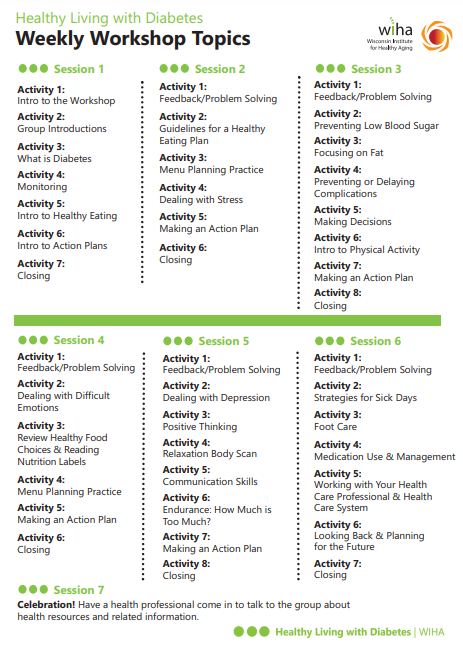Healthy Living with Diabetes

Get back to living your healthiest life. Healthy Living with Diabetes can help.
Maybe you took some things for granted – like eating what you want, when you want or taking a break from exercise. Then you found out you have diabetes. Now managing your medications and lifestyle feels like a full time job. It can be overwhelming.
6 weeks. 15 hours. A lifetime of new options for a healthier you.
Everyone knows new habits take time. In the Healthy Living with Diabetes (HLWD) workshop you get the time and encouragement you need to make the changes you want to make. You’ll build new skills, practice what you learn, and share your experience with others. You’ll set your own goals and priorities. Week by week, you’ll see what works for you and take steps toward healthier living.
A proven program to improve health and well-being for people with diabetes. Learn and share with others. Designed especially for adult learners like you.
Healthy Living with Diabetes (HLWD) is a high-level evidence-based workshop for people who have diabetes offered in English and Spanish around Wisconsin. Developed at Stanford University, the workshop meets for 2-1/2 hours, once a week, for six weeks. This community-based program offers tools and resources to enhance your understanding of what it means to have diabetes. Group support helps you build the confidence to manage your diabetes and maintain an active and fulfilling life. It is facilitated by two trained leaders in a small group setting. Each week has various topics related to mental, physical, and emotional wellbeing. Gain knowledge, share your experience, practice new skills, and help others.
At a Healthy Living with Diabetes workshop, you’ll do more than learn about your condition. You’ll practice strategies, support others, and gain new tools to take better care of yourself.
You are eligible to participate in this program if you:
The program does not replace existing treatments, but serves to complement your current medical treatment plan.
Healthy Living with Diabetes has been researched and proven to:
18 months after the workshop (compared to baseline) participants had:
Research Articles and Resources: See these sites describing the original research supporting the Stanford Diabetes Self-Management Program.
“We learned so much about food, food labels, and food menus”
-Jim Coffman, Vilas County
“My eating was already pretty good, it just helped me understand better, between portion sizes and portion control. And just being more aware of what I am eating and aware that I should be eating more vegetables. And then how to put things together like protein and a carbohydrate. Now I am able to keep those things in mind when making my food choices, which before I didn’t.” – Gloria, Eau Claire County
-Gloria, Eau Claire County
Need more support?
Once you participate in a Healthy Living with Diabetes workshop, you’ll have a good understanding of the importance of working with a diabetes care and education specialist at an accredited Diabetes Self-Management Education and Support (DSMES) program, usually located at a clinic or hospital. DSMES is a covered benefit of Medicare and most health insurance plans when offered through an accredited program. Participating in accredited DSMES has been shown to improve health outcomes.
Watch the video below to learn more about DSMES
https://www.youtube.com/watch?v=KYXpnzFqnTM%20
According to the Association of Diabetes Care and Education Specialists (ADCES), a diabetes care and education specialist at a DSMES program works with you to develop a management plan that fits your health beliefs, cultural needs, current knowledge, physical limitations, emotional concerns, family support, financial status, medical history, health literacy, numeracy, and other factors that can influence your ability to meet the challenges of managing diabetes. They can also help you understand how to use devices like meters, insulin pens, pumps, and continuous glucose monitoring devices; and, use the information from these devices and your lifestyle to identify patterns and opportunities for improvement.
Together, you’ll work to find solutions that address your most pressing challenges. Ask your primary care provider about working with a diabetes care and education specialist or to find an accredited program near you, click the button below.
Questions? Contact cc@wihealthyaging.org
Interested in becoming a facilitator? Visit our Become a Facilitator page to learn more.

